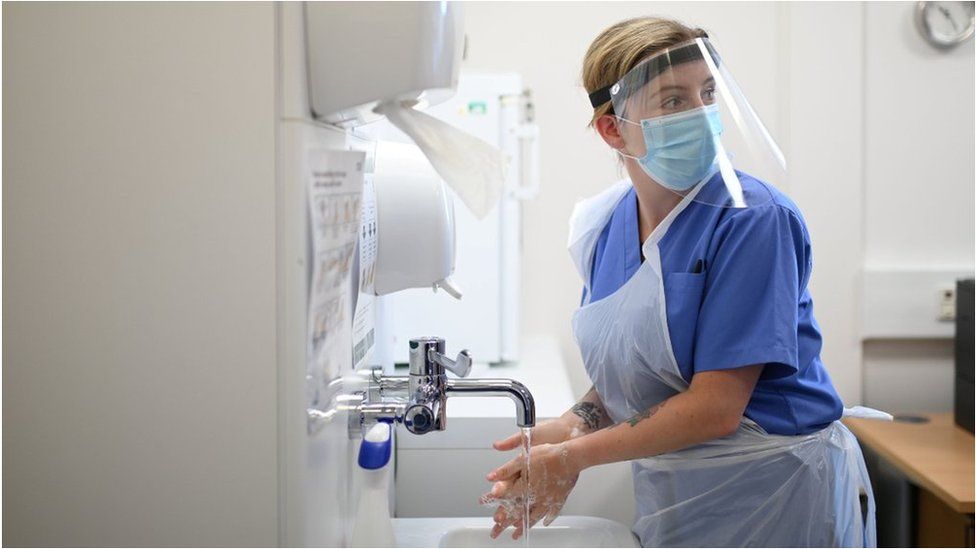ARTICLE AD BOX
 Image source, Reuters
Image source, Reuters
By Anthony Reuben and Lucy Gilder
BBC Reality Check
Nurses in England, Wales and Northern Ireland are to strike on 15 and 20 December as part of their dispute over pay.
They are members of the Royal College of Nursing (RCN), which represents two thirds of UK nurses. It says they have been getting a "raw deal" on pay for years.
But Education Secretary Gillian Keegan told Sky News on 9 November: "I think the average when I last looked was £34,000 before these increases so it's more than the average salary across the country."
What is average pay for nurses?
The £34,000 figure is used in the report from the NHS Pay Review Body, which recommends what should happen to NHS pay in England.
In the category "nurses and health visitors" the average basic pay per full-time employee was given as £34,275, but that is a figure for March 2021.
The government says that figure increased to £35,600 by March 2022, and that nurses were then given a £1,400 increase, which should take the average up to £37,000.
Is that above average?
The education secretary also described that figure as being "more than the average salary across the country".
That depends on which average you're talking about.
The mean UK full-time salary, which is what you get if you add up the amount all full-time employees are paid and divide by the number of full-time employees, is £39,966, according to the figures for April 2022 from the Office for National Statistics (ONS).
But from the same report, the median, which is the amount that half of full time employees will be earning more than, and half will be earning less than, is £33,000.
So the average figure for nurses is higher than the median salary but lower than the mean.
The median is the figure often used for wages because it is not skewed by small numbers of very highly paid people.
The mean and median for nurses themselves tend to be very similar, because there are not many nurses who are very highly paid.
That same report from the ONS gives the full-time mean for the category "nursing professionals" as £37,799 while the median is £37,255. That figure is probably higher because it includes nurses in the private sector, not just NHS nurses.
How does it vary between grades?
The most common grade for NHS nurses is Band 5, which accounts for about 42% of nurses in England.
That's the pay grade for newly qualified nurses - their salaries range between £27,055 and £32,934.
Band 6 is more senior nurses and specialists and their basic pay is between £33,706 and £40,588.
Band 7 includes ward sisters and junior matrons, earning between £41,659 and £47,672.
Band 8 is divided into four sections, including senior matrons, heads of department and nurse consultants, who can earn between £48,526 and £91,787.
There are also 306 nurses in Band 9, who are chief nurses or deputy chief nurses and can earn between £95,135 and £109,475.
How does it vary across the UK?
RCN members voted for action in every service in Scotland and Northern Ireland and on all but one health board in Wales.
- The starting salary of a nurse in NHS Scotland is £26,104. An experienced nurse at the top of Band 5 earns around £33,000.
- In Wales, a band 5 nurse earns between £27,055 and £32,934.
- In Northern Ireland, it's last year's pay scales as the award this year hasn't been implemented due to the political situation. The top of band 5 earns around £31,534.
Can nurses earn extra on top of that?
The standard full-time working week for NHS staff is 37.5 hours.
Staff in pay bands one to seven are eligible for overtime payments, which is 1.5 times the hourly rate or twice the hourly rate for working on bank holidays.
They can also get allowances for working in high cost areas (London and surrounding counties) and for being on call.
Has nurses' pay kept up with inflation?
Nurses' pay has not kept up with rising prices since 2010. They have had a real terms pay cut of more than 10%.
It has also failed to keep up with average earnings, either in the private sector or the public sector, as the Institute for Fiscal Studies has confirmed.
With strikes on the horizon, here's a bit of context on what's been happening to average nurse pay in England.
Since 2010, nurses' pay (the purple line) has lagged behind inflation, and behind average pay growth in both the public and private sectors. pic.twitter.com/FKiNDxlzq0
The BBC is not responsible for the content of external sites.View original tweet on Twitter
Correction: An earlier version of this story incorrectly referred to Gillian Keegan as the health secretary.

 2 years ago
32
2 years ago
32









 English (US) ·
English (US) ·